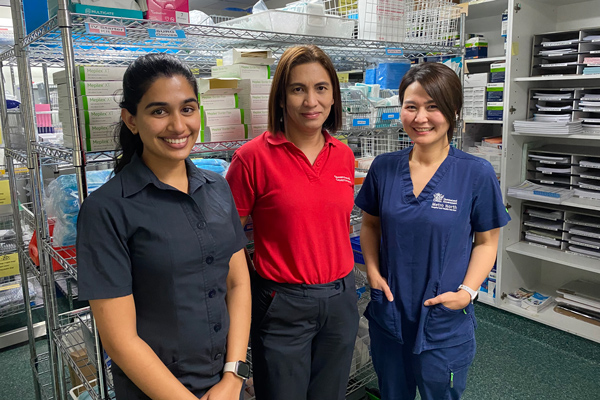- Foreword
- Message from Board Chair & Chief Executive
- 2023 Clinical Research Fellowships
- A message from the RBWH Foundation
- A message from The Common Good
- Metro North Research Excellence Awards
- Research stories
- ICU of the Future
- New approach ruling out pulmonary embolism
- Improving access to healthcare in the prison environment
- Safety and efficacy of peripheral versus centrally administered vasopressor infusion
- COVID-19 learnings set to inform future policy
- Telomere study could provide key to treating debilitating lung disease
- Productive Ward – Releasing time to care
- Brain organoids to revolutionise epilepsy treatment
- Reducing weight stigma in maternity care
- Parkinson’s Disease Check-In program giving people a voice
- Trial brings new treatment for common heart condition
- Teledentistry study shows promise in residential aged care
- Research fellow to boost Oral Health evidence-based care
- Study explores best approach to surgery for painful shoulder osteoarthritis
- The development and pilot testing of a stroke telerehabilitation decision toolkit
- Metro North Health delivers world-first breast scaffold surgery
- Regenerative jawbone hard at work care of collaborative Metro North Health approach
- Jamieson Trauma Institute leads e-scooter and e-bike injury research to drive community safety
- Forgotten fathers in pregnancy and obstetrics
- Putting the Spotlight on nursing and midwifery research
- Improving the health self-efficacy of stroke survivors
Productive Ward – Releasing time to care

RAS Unit nurses are releasing more time to care through the Productive Ward program
Nursing staff in The Prince Charles Hospital’s Rehabilitation and Acute Stroke unit are investigating how the implementation of an internationally recognised nursing quality improvement program is enhancing work processes and giving staff more time for patient care.
Staff introduced the Productive Ward program after it was identified that the physical work environment was impacting on work flows and overall efficiency.
The Productive Ward program, designed by the National Health Service in the United Kingdom around a decade ago, is one of the most successful nursing quality initiative programs designed to improve patient and staff experience and make changes to the ward environment to enhance productivity, efficiency, patient safety, and quality of care.
It focusses on creating ‘lean processes’ by removing or moderating unnecessary activities or processes that detract from time spent on direct patient care.
From the program’s 13 modules, RAS unit nursing staff chose to adopt the ‘Well Organised Ward’, focusing on the redesign of the ward environment and systems to improve efficiency, productivity and safety, as well as enhance patient outcomes and staff satisfaction.
Project lead Jenny Kim said nursing staff recognised that too much was being spent on non-patient care activities as a result of current organisational processes and systems.
Research was undertaken via staff interviews and focus groups, online surveys and workshops to identify areas where ward processes and systems could be improved.
This identified that the key issues affecting the overall productivity of the ward related to lack of structured process for stock storage, ordering and access, inconsistent practices between different nursing stations, and increased workload around the ward’s complex patient cohort.
“We found that the absence of a structured stock storage system meant that staff were spending more time and effort walking every day to locate the item they needed,” Jenny said.
“The lack of a coordinated storage system also meant that staff were over ordering consumables, resulting in an increase in the ward’s overall costs.”
Following the introduction of the Productive Ward program, the RAS unit has since established several practices to improve productivity and efficiency. These include:
- Redesigning the system for organising and ordering clinical consumables,
- Clear labelling of equipment in the storage area and throughout the ward,
- Visual representation of equipment via pictures and labels in each storage room,
- Removing cupboard doors in treatment room to enable efficient location and access to medications,
- Installing baskets in each patient’s room for emergency equipment and utilising the patient board for the allied health focussed update board.
“Through streamlining some basic organisational processes, we have been able to improve the efficiency for our staff and patient safety, while ensuring cost effective utilisation of resources,” Jenny said.
“Importantly, it means that staff can access equipment and medications quicker, allowing them to spend more time with and provide better care to our patients. This leads to an increase in staff satisfaction and a more positive patient experience.”
Evaluation of the program is ongoing.
